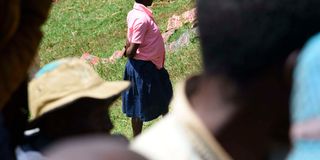Schoolgirl crisis: One in five Kenyan teenagers now face motherhood

A pregnant school girl in this photo taken on December 11, 2022. A new report has revealed that Kenya's teenage pregnancy rate has jumped to 19.9 per cent.
What you need to know:
- A new report has revealed that Kenya's teenage pregnancy rate has jumped to 19.9 per cent, surpassing previous estimates, with school boyfriends being the leading perpetrators at 29.1 per cent, followed by neighbours and relatives.
- The study by Fawe Kenya shows Turkana county leading with a 34 per cent dropout rate, while 31.4 per cent of girls lack basic educational support, and 57 per cent cannot afford menstrual products.
A new report has unveiled alarming statistics regarding teenage pregnancies in Kenya, attributing the high rates to pervasive gender inequality, limited access to services, and entrenched poverty.
The report, titled "Situational Analysis Report on Teenage Pregnancies in Kenya," highlights the vulnerability of adolescent girls, particularly those in rural areas.
The survey findings that was commissioned by Forum for African Women Educationalists Kenya (Fawe) and conducted by Seamays International Research, notes the teenage pregnancy rate has surged to 19.9 per cent, surpassing the previous estimate of 15 per cent from the Kenya Demographic and Health Survey (KDHS) 2022.
The report based on a sample of 1,030 school-going girls, reveals that socio-economic challenges are pushing many girls into risky situations.
In counties like Turkana, Garissa, and Narok, dropout rates among girls are staggering, with Turkana leading at 34 per cent.
Many families struggle to meet basic needs, leaving 31.4 per cent of girls feeling unsupported in their education.
The situation is exacerbated for girls with special needs, who represent six per cent of the surveyed population.
The report identifies school boyfriends as the leading perpetrators of teenage pregnancies (29.1 per cent), followed by neighbours (18.4per cent) and relatives (10.6 per cent). Peer pressure and the influence of social media are significant contributors, with 59 per cent of girls reporting peer influence in their decisions to engage in sexual activities.
In response to these pressing issues, the “Imarisha Msichana Program” aims to empower young girls and reduce rates of teenage pregnancy and child marriage. Recommendations include strengthening parental supervision, promoting school clubs for open discussions about sexual health, and ensuring access to menstrual products, which 57 per cent of girls currently lack.
Authorities are urged to report cases of teenage pregnancies to child protection organisations and ensure that perpetrators face legal consequences.
Furthermore, the report tasks the Ministry of Education to enhance counselling services and raise awareness about the harmful effects of early pregnancy and child marriage.





